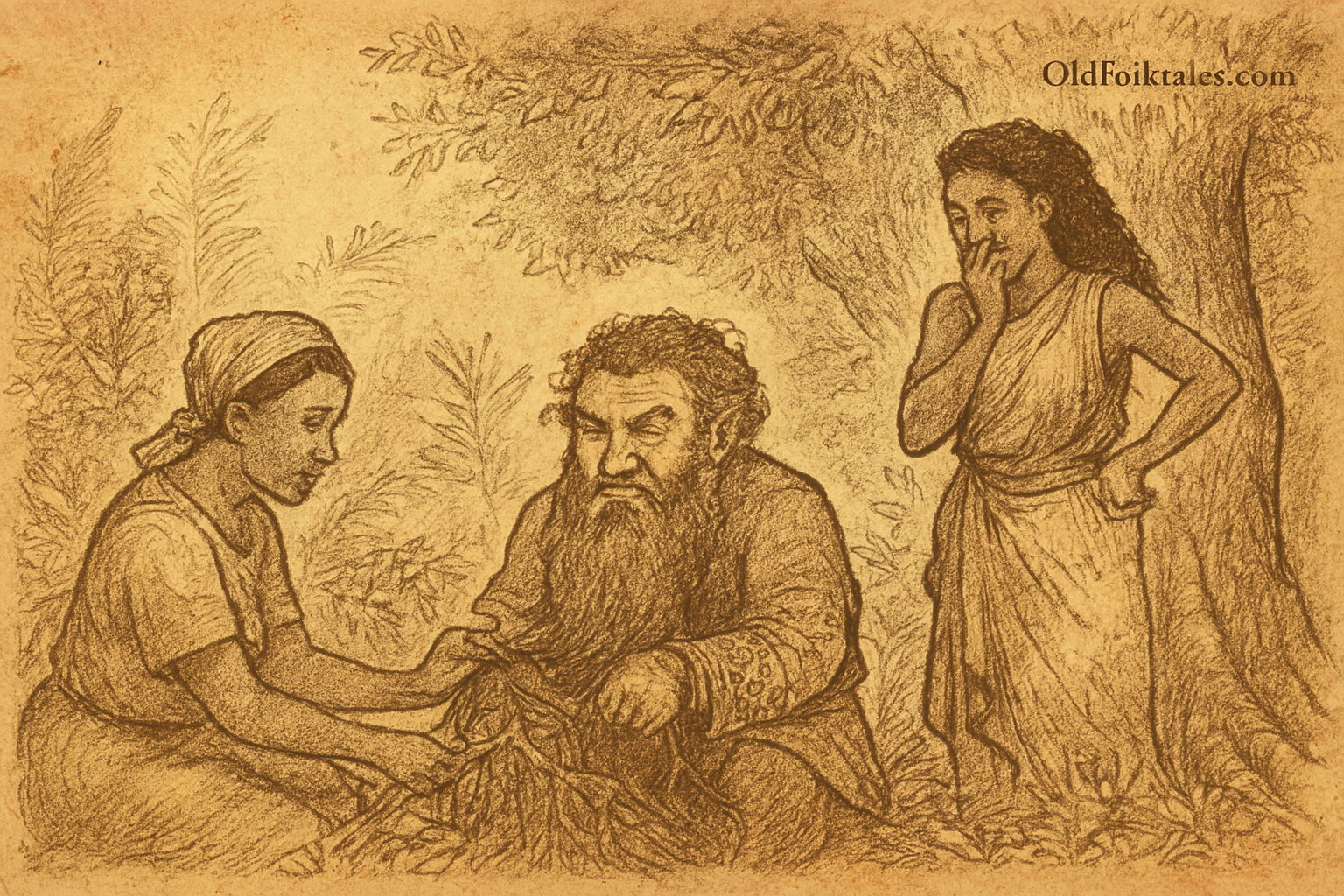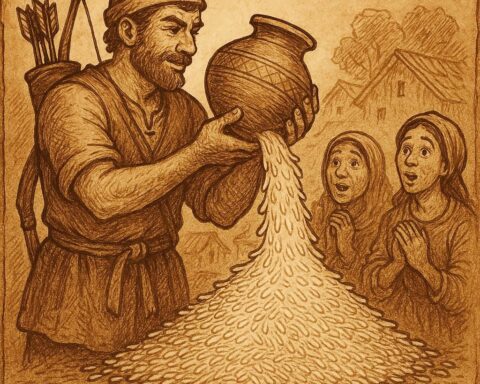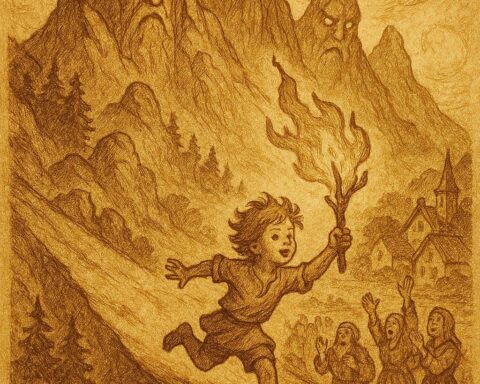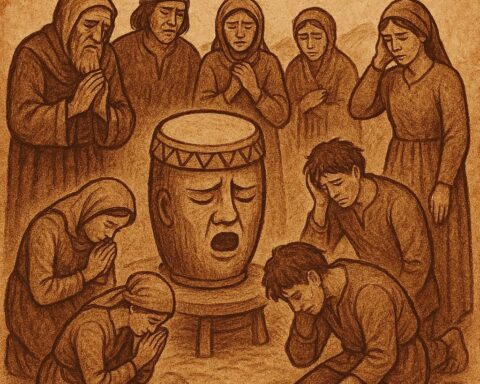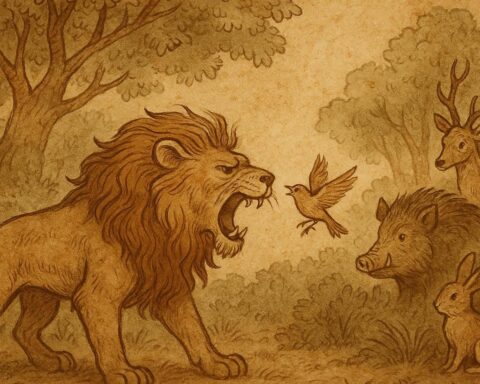In the heart of ancient Igboland, where the forest whispered secrets to those who knew how to listen and the rivers sang lullabies to sleeping villages, there stood a small settlement blessed by the gods yet tested by time. The air here carried the scent of palm wine and roasting yams, while the sound of talking drums echoed across the rolling hills at sunset. It was in this place, where tradition flowed as steady as the great Niger River, that two remarkable sisters made their home.
The elder sister was called Adamma, a name that meant “daughter of beauty,” though her true beauty lay not in her features but in her spirit. She moved through life with the grace of morning mist, her voice soft as rainfall on banana leaves. When she spoke, even the most stubborn children would listen, and when she smiled, it was said that the very flowers turned their faces toward her. Adamma possessed the rare gift of seeing goodness in all things, finding light even in the darkest corners of human nature.
Her younger sister, Omalicha, bore a name meaning “beautiful one,” and she lived up to it with a vibrancy that could rival the most brilliant sunset. Where Adamma was gentle streams, Omalicha was rushing waterfalls. Her laughter rang out like celebration bells, and her spirit danced through every moment of every day. She possessed a boldness that both delighted and occasionally worried the village elders, for she feared neither man nor beast nor spirit.
Also read: How Two Sisters Battle Jealous Spirits
Despite their contrasting natures or perhaps because of them, the sisters shared a bond that had become legendary throughout their village and beyond. The people would say, with knowing smiles, “Where Adamma plants her feet, there Omalicha’s shadow falls, and where Omalicha’s voice is heard, there Adamma’s wisdom follows.” They were like two halves of the same palm nut, complete only when together.
Their mother, a woman weathered by years of struggle yet strengthened by love, had raised them alone after their father joined the ancestors. She kept a modest hut at the forest’s edge, where the boundary between the world of humans and the world of spirits grew thin. Here, the three women lived simply but richly, their days filled with the honest work of farming cassava and weaving beautiful mats that were sought after in distant markets.
Each evening, as the sun painted the sky in shades of gold and crimson, the family would gather around their fire. The flames would dance while Adamma’s gentle voice wove tales of ancient heroes, and Omalicha’s animated gestures brought every story to life. Their mother would add her own wisdom, passed down through generations of strong women who had faced whatever trials the world brought them.
When the harmattan winds arrived that year, bringing with them the dry, dusty breath of the Sahara, the village prepared for the harsh season ahead. It was during one of these cold, wind-whipped nights that destiny came knocking at their humble door.
The knock was heavy, urgent, and when the sisters opened their door, they found a figure that seemed to have stepped from the pages of legend itself. Before them stood a great hunter, his powerful frame draped in animal skins and dust from countless journeys. His face, weathered by sun and wind, bore the marks of a man who had seen both wonder and hardship. His long beard, wild and unkempt, spoke of months in the wilderness, and his eyes held depths that seemed to contain stories of their own.
Adamma, true to her nature, immediately welcomed the stranger with the warmth that had made her beloved throughout the village. “Come, friend,” she said, stepping aside to let him enter their simple home. “The night is cold, and no traveler should face the harmattan alone.”
Omalicha, however, could barely contain her amusement at the man’s appearance. She giggled at his magnificent beard, now decorated with thorns and leaves from his forest travels, and whispered jokes about his mud-caked boots. Yet even in her teasing, there was no malice, only the playful spirit that defined her very essence.
Despite Omalicha’s gentle mockery, both sisters honored the sacred duty of hospitality that their culture held dear. They brought the hunter fresh water to wash the dust of travel from his hands and face, prepared a meal of pounded yam and palm nut soup, and spread their finest mat for him to rest upon. Their kindness flowed as naturally as breathing, for this was the way they had been raised, to see in every stranger a potential blessing from the gods.
The next morning dawned bright and clear, and the sisters ventured into the forest to gather the firewood that would keep their hearth warm through the cold season. The forest was alive with the sounds of birds and rustling leaves, and shafts of golden sunlight pierced the green canopy above them, creating a cathedral of natural beauty.
It was here, in this sacred space where humans rarely ventured, that they encountered something that would change their lives forever. Deep among the ancient trees, they heard a voice raised in anger and frustration, cursing with words that made even bold Omalicha blush. Following the sound, they discovered a sight both comical and pathetic: a dwarf spirit, no taller than a child but with the dignified bearing of an elder, had somehow managed to trap his magnificent beard in the twisted roots of an ancient iroko tree.
The spirit struggled and pulled, his face red with exertion and embarrassment, while his elaborate beard, clearly his pride and joy, remained stubbornly caught. His clothes, rich with the shimmer of otherworldly fabric, were now dirty and torn from his efforts.
Adamma approached with characteristic gentleness, her hands steady and patient as she carefully worked to free the trapped beard from the gnarled roots. Her touch was so light that the spirit barely felt it, yet so skillful that the task was accomplished in moments.
Omalicha, meanwhile, could not resist commenting on the absurdity of the situation. “How does one as wise as you manage to trap himself so thoroughly?” she asked with a grin that took the sting from her words. “Perhaps spirits need to watch where they’re going just like the rest of us!”
Instead of gratitude, however, the dwarf spirit’s eyes flashed with indignation. “Foolish girls!” he snapped, his voice carrying the authority of ages. “You dare to laugh at one who walked these forests before your great-grandmothers were born? Your mockery will not be forgotten!” With that, he vanished into the undergrowth, leaving only the faint scent of wild honey and the memory of his angry words.
The sisters exchanged puzzled glances but continued about their work, for they had learned from their mother that the ways of spirits were not always meant to be understood by mortal minds.
Days passed, and the encounter might have been forgotten entirely, but fate had more lessons in store. While checking their fish traps by the river, the sisters heard familiar cursing echoing across the water. There, tangled hopelessly in his own fishing net, was the same dwarf spirit. His struggles had only made the situation worse, and he hung suspended above the water like a very dignified but very stuck fish.
Once again, the sisters came to his aid. Adamma’s patient hands worked to untangle the complex knots while Omalicha offered cheerful commentary about the spirit’s fishing techniques. And once again, instead of thanks, they received only scolding and complaints before the spirit disappeared in a huff of wounded pride.
The third encounter came when the sisters least expected it. They had been walking the forest path that led to their favorite palm wine tapper when the sound of terrible roaring filled the air. Racing toward the noise, they found their dwarf spirit running for his life, pursued by a massive leopard whose golden coat rippled with muscle and whose eyes burned with predatory hunger.
The spirit’s short legs were no match for the great cat, and terror had replaced his usual arrogance. “Help me!” he cried, his voice cracking with fear. “Please, help me!”
But before either sister could move, a familiar figure stepped from the shadows of the forest. The hunter they had sheltered moved with fluid grace, his spear singing through the air to strike the leopard with deadly precision. The great cat fell, its threat ended, and silence returned to the forest.
Then, as the dust settled and the sisters stared in amazement, the hunter began to change before their very eyes. His rough clothes became fine robes, his weathered face grew smooth and noble, and a crown of light seemed to settle upon his brow. He was no ordinary man, but a prince of the spirit realm, cursed to wander the earth in humble form until he had been shown genuine kindness three times by mortals who expected nothing in return.
“Your kindness has broken the curse that bound me,” the prince said, his voice now carrying the music of divine authority. “Because you opened your hearts and your home to a stranger, I am free to return to my rightful place. In gratitude, I offer to take one of you as my bride, to share in the riches of the spirit world.”
The offer was magnificent, power, wealth, and immortality beyond anything the sisters had ever imagined. But when they looked at each other, they saw reflected in each other’s eyes the same unwavering truth that had always defined them.
“We are grateful for your offer, noble prince,” Adamma spoke with quiet dignity, “but we cannot be separated. Our bond is the source of our strength.”
“Where one goes, both must go,” added Omalicha, her usual playfulness replaced by solemn certainty. “We are two parts of one whole.”
The prince, moved by their loyalty, smiled with understanding that came from his own divine wisdom. “Then I shall honor your bond,” he declared. “I will build for you and your mother a compound worthy of your nobility of spirit, and I will see that your family prospers for generations to come.”
True to his word, the prince used his restored powers to create for them a beautiful home, with gardens that bloomed year-round and fields that yielded abundant harvests. The dwarf spirit, chastened by his rescue and perhaps finally understanding the true nature of kindness, was never seen again in their forest.
Years passed, and the story of Adamma and Omalicha spread throughout Igboland and beyond. Mothers told it to their daughters, and grandmothers whispered it to their granddaughters, always ending with the same profound truth that the sisters had embodied with their very lives.
Moral Lesson
The tale of Adamma and Omalicha teaches us that true strength lies not in individual power or magical abilities, but in the unbreakable bonds of love and loyalty we share with those closest to us. Their story reminds us that kindness shown without expectation of reward opens doors that even magic cannot unlock, and that sometimes the greatest treasure is not what we gain, but what we refuse to give up.
Knowledge Check
Q1: Who are the main characters in this Igbo folktale and what do their names mean? A1: The main characters are sisters Adamma (meaning “daughter of beauty”) and Omalicha (meaning “beautiful one”), along with their widowed mother, a cursed prince disguised as a hunter, and a dwarf spirit. Adamma is gentle and quiet, while Omalicha is bold and lively.
Q2: What cultural elements from Igbo tradition are featured in this story? A2: The story includes traditional Igbo elements such as the harmattan winds, village life at the forest’s edge, hospitality customs, palm wine, pounded yam, talking drums, the iroko tree, and the belief in forest spirits and divine intervention.
Q3: How many times did the sisters help the dwarf spirit, and what does this represent? A3: The sisters helped the dwarf spirit three times: freeing his beard from tree roots, untangling him from a fishing net, and indirectly saving him from a leopard. The number three often represents completion or fulfillment in folktales and is the key to breaking the prince’s curse.
Q4: What was the hunter’s true identity and why was he cursed? A4: The hunter was actually a prince from the spirit realm who had been cursed to wander the earth in humble form until he received genuine kindness three times from mortals who expected nothing in return. The sisters’ hospitality helped break his curse.
Q5: Why did the sisters refuse the prince’s offer of marriage, and what does this teach us? A5: The sisters refused to be separated because their bond was unbreakable, they believed they were “two parts of one whole.” This teaches that some relationships are more valuable than wealth or status, and that loyalty and love are the greatest treasures.
Q6: What is the main moral lesson of this Igbo folktale? A6: The story teaches that sisterly love and loyalty create strength that surpasses magical powers or material wealth. It also shows that acts of kindness performed without expecting rewards can lead to unexpected blessings, and that true bonds cannot be broken by temptation or hardship.
Source: Traditional Igbo folktale, Nigeria
